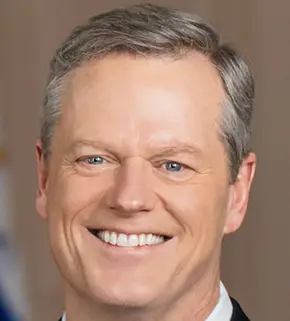
The NCAA announced Thursday that Charlie Baker, the governor of Massachusetts, will serve as the next NCAA president, assuming the role effective March 2023.
Baker succeeds Dr. Mark Emmert, a passionate leader and ambassador for college sports. Emmert will continue to serve the NCAA as a consultant through June 2023.
A former collegiate athlete at Harvard, Baker is credited with bringing bipartisan leadership to the state, successfully guiding Massachusetts through an exceptionally turbulent period for government officials. In addition to his two terms as governor, he brings decades of experience spearheading transformations at high profile institutions in the private and public sectors.
Baker’s appointment marks the culmination of a comprehensive and inclusive national search process, led by a subcommittee of the NCAA Board of Governors and TurnkeyZRG, the top search firm in the space (which recently placed the commissioners of the ACC, Pac-12 and Big 12). Baker’s term as governor ends January 5, 2023.
“We are excited to welcome Governor Charlie Baker to the NCAA and eager for him to begin his work with our organization,” said Linda Livingstone, president of Baylor University and chair of the NCAA Board of Governors, who helmed the presidential search committee, in a statement. “Governor Baker has shown a remarkable ability to bridge divides and build bipartisan consensus, taking on complex challenges in innovative and effective ways. As a former student-athlete himself, husband to a former college gymnast, and father to two former college football players, Governor Baker is deeply committed to our student-athletes and enhancing their collegiate experience. These skills and perspective will be invaluable as we work with policymakers to build a sustainable model for the future of college athletics.”
“We know that to be successful, the NCAA president needs to possess the ability to balance competing priorities, inspire a shared vision, and create a broad sense of trust,” said Grant Hill, an independent member of the NCAA Board of Governors and member of the presidential search committee. “As governor of Massachusetts and a successful private sector CEO, Charlie Baker has demonstrated the type of results-oriented, bipartisan approach that we will need to bolster the well-being of student-athletes, realize the opportunities and overcome the challenges facing the NCAA.”
Baker arrives at the NCAA at a moment of significant transformation. Legal shifts in the environment surrounding college sports have challenged the NCAA’s ability to serve as an effective national regulator for college athletics, resulting in an untenable patchwork of individual state laws. Partnering with federal policymakers to develop a consistent, sustainable legal framework to address issues common to student-athletes and athletic departments across the country will be a top and immediate priority. Throughout the search process, Governor Baker’s history of successfully forging bipartisan solutions to complex problems stood out to the search committee as uniquely suited to the NCAA’s present needs.
“I am honored to become the next president of the NCAA, an organization that impacts millions of families and countless communities across this country every day,” said Baker. “The NCAA is confronting complex and significant challenges, but I am excited to get to work as the awesome opportunity college athletics provides to so many students is more than worth the challenge. And for the fans that faithfully fill stadiums, stands and gyms from coast to coast, I am eager to ensure the competitions we all love to follow are there for generations to come. Over the coming months, I will begin working with student-athletes and NCAA members as we modernize college sports to suit today’s world, while preserving its essential value.”
As the NCAA strives to enhance the experience of more than 500,000 young people that compete in college sports each year, student-athletes’ input factored significantly in the development of the president’s job description.
“As a student-athlete representative on the search committee, I focused my conversations with Governor Baker around many of the issues that student-athletes face today,” said Isaiah Swann, a former baseball student-athlete at the University of Texas-Dallas and a current second year MD-PhD student at the University of Virginia. “Throughout our discussions, he not only demonstrated a command of the top issues confronting college sports but, more importantly, also displayed empathy, open-mindedness, and a desire to better understand and address student-athletes’ perspectives. The Baker family’s connection to collegiate athletics runs deep. He’s one of us. He thinks like a student-athlete and will lead us forward with our perspectives in mind.”
Prior to recruiting candidates, the search committee spent months identifying and assessing the qualities most needed in the organization’s next president, including input from more than 300 individual NCAA stakeholders.
Baker will be charged with building on the NCAA’s ongoing transformation efforts. In early 2022, the NCAA ratified a new constitution, assigning greater powers of self-governance to each of its three divisions, its dozens of athletic conferences, and its member schools. The NCAA also appointed committees in Divisions I, II, and III to implement the new constitution at their respective levels, including a Division I Transformation Committee. The Division I Transformation Committee is now concluding its work putting forward a comprehensive series of recommendations to modernize Division I to better support today’s student-athletes.
The NCAA’s search committee consisted of:
Linda Livingstone, president, Baylor University
Mary-Beth Cooper, president, Springfield College
Beth DeBauche, commissioner, Ohio Valley Conference
Grant Hill, independent member, co-owner of the Atlanta Hawks
Jere Morehead, president, University of Georgia
Steven Shirley, president, Minot State University
Isaiah Swann, former baseball student-athlete at the University of Texas at Dallas


